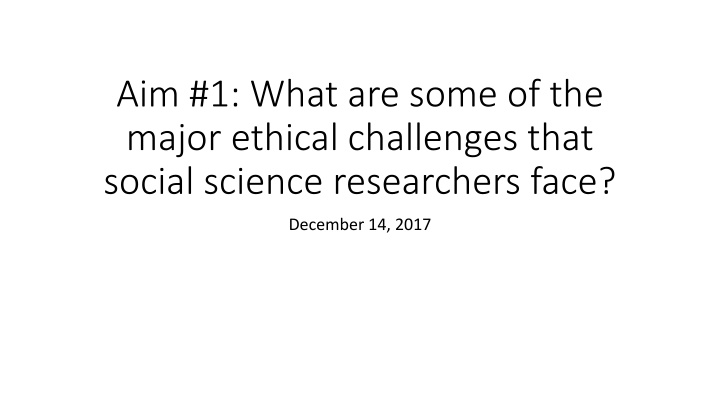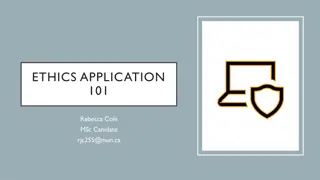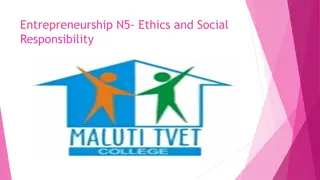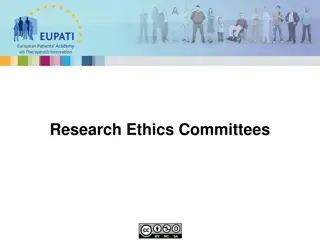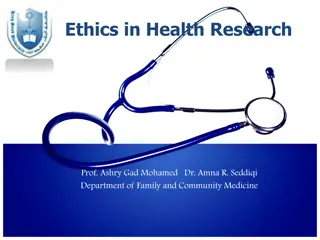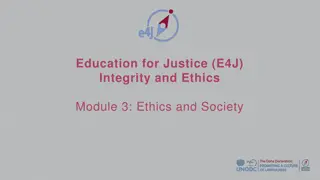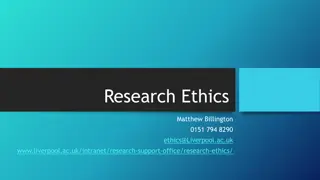Ethical Challenges in Social Science Research
Social science researchers face major ethical challenges in their work, as highlighted through case studies such as Zellner Research (1978), Humphreys Report (1970), and The Scarce Research (1993). These cases raise questions about issues such as informed consent, privacy, misrepresentation of research intentions, and the obligation to testify in legal proceedings. Balancing the right to know with the right to privacy is a key dilemma, underscoring the complexity of ethical considerations in social science research.
Download Presentation

Please find below an Image/Link to download the presentation.
The content on the website is provided AS IS for your information and personal use only. It may not be sold, licensed, or shared on other websites without obtaining consent from the author.If you encounter any issues during the download, it is possible that the publisher has removed the file from their server.
You are allowed to download the files provided on this website for personal or commercial use, subject to the condition that they are used lawfully. All files are the property of their respective owners.
The content on the website is provided AS IS for your information and personal use only. It may not be sold, licensed, or shared on other websites without obtaining consent from the author.
E N D
Presentation Transcript
Aim #1: What are some of the major ethical challenges that social science researchers face? December 14, 2017
I. A.
II. Ethical Case Studies Zellner Research (1978): William Zellner wanted to interview the family, friends and acquaintances of persons killed in single-car crashes that he thought might be autocides (suicides that the individual carried out with a car). By interviewing people who knew the victims, he hoped to obtain information that would help determine if the deaths were accidental or intentional. To recruit respondents, he suggested that their participation in his study might reduce the number of accidents in the future. However, he did not mention that he suspected autocide. In each interview, he asked if the deceased had recently talked about suicide or himself/herself in a negative manner. He determined that at least 12 percent of fatal single-occupant crashes are suicides. Was Zellner s research unethical because he misrepresented the reasons for his study? In this situation, does the right to know outweigh the right to privacy?
II. Ethical Case Studies Humphreys Report (1970): Laud Humphreys was a graduate student who wanted to study homosexual activity. His research focused on homosexual acts in tearooms, public rest rooms in parks. He did not ask permission of his subjects, nor did he inform them that they were being studied. Instead, Humphreys showed up at the public rest rooms and were known to be tearooms and offered to be a lookout while others engaged in homosexual acts. Then, he systematically recorded the encounters that took place. To learn more about the everyday lives of the people involved, he wrote down their license plate numbers and tracked down their names and addresses. Later, he arranged for these men to be included in a medical survey so that he could interview them personally. He wore different disguises and drove a different car so they wouldn t recognize him. From these interviews, he determined that most of the men were married to women and lived very conventional lives. Was Humphrey s research unethical? Why or why not? In this situation, does the right to know outweigh the right to privacy?
II. Ethical Case Studies The Scarce Research: As a graduate student in 1993, Rik Scarce was jailed for over five months because he refused to testify before a grand jury investigating break-ins by animal-rights activists at a Washington State University laboratory. Scarce had previously interviewed activists in the environmental movement, and investigators believed that Scarce might have information about an activist involved in the break-ins. Scarce refused to testify because he did not want to violate the confidentiality of his subjects. He was also concerned that activists within the environmental movement may refuse to speak to me if I testify, and stated that social scientists in the future might be less willing to go out and do research that requires them to promise confidentiality to their respondents if they could be required to testify. Did Rik Scarce make the right decision? Should social scientists have the right to refuse to testify about possible crimes in court if they feel that doing so violates their research ethics?
